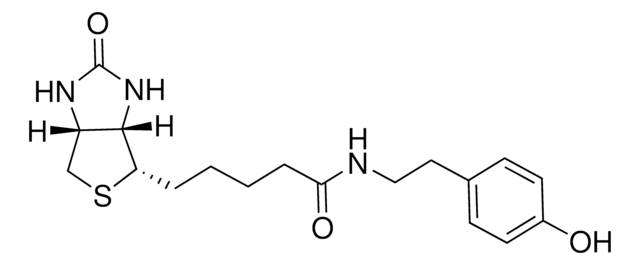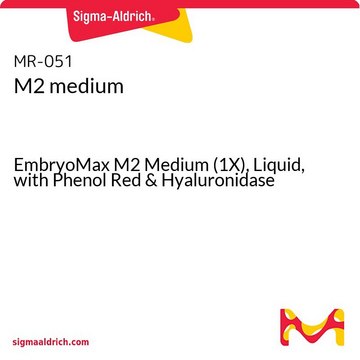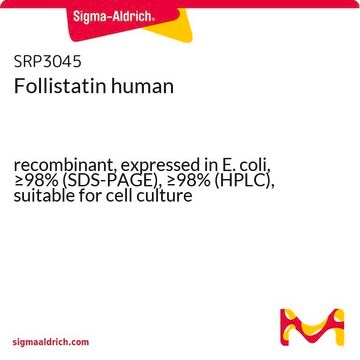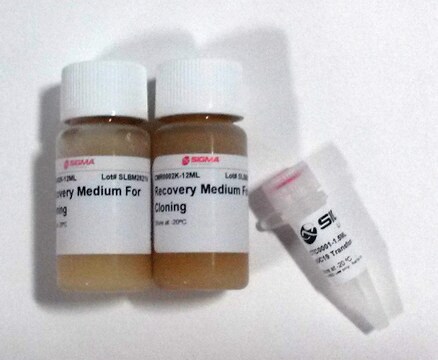Wszystkie zdjęcia(1)
Kluczowe dokumenty
F1175
Follistatin 300 human
≥90% (SDS-PAGE), recombinant, expressed in Sf21 cells, lyophilized powder, suitable for cell culture
Synonim(y):
FS 300
Zaloguj sięWyświetlanie cen organizacyjnych i kontraktowych
About This Item
Polecane produkty
pochodzenie biologiczne
human
Poziom jakości
rekombinowane
expressed in Sf21 cells
Próba
≥90% (SDS-PAGE)
Formularz
lyophilized powder
siła działania
0.1-0.4 mg per mL
masa cząsteczkowa
31 kDa
opakowanie
pkg of 25 μg
warunki przechowywania
avoid repeated freeze/thaw cycles
metody
cell culture | mammalian: suitable
zanieczyszczenia
endotoxin, tested
numer dostępu UniProt
temp. przechowywania
−20°C
informacje o genach
human ... FST(10468)
Opis ogólny
FST (follistatin) is an activin-binding protein, and exists in two isoforms due to alternate splicing, FS288 and FS315. It is a glycoprotein with a single chain, and acts as an activin antagonist. It has a high level of expression in fetal membranes and placenta.
Zastosowanie
FST (follistatin) has been used for trophoblast fusion assay and the measure of hCG (human chorionic gonadotropin) concentration in hormone assays. It is also suitable for the development of chondrocytes from hESc (human embryonic stem cells) by a new 3-Stage directed differentiation protocol (DDP).
Działania biochem./fizjol.
FST (follistatin) binds to and regulates activins, which in turn are TGF (transforming growth factor)-β superfamily members. The expression level of FST and its binding partner activin A is elevated in inflammatory disorders. The activin A-follistatin system plays an essential role in the modulation of glucose and lipid metabolism, which might have an overall effect on fetal growth. In adipose tissue, it facilitates the adipogenic differentiation of progenitor cells.
High-affinity activin-binding protein that can act as an activin antagonist.
Postać fizyczna
Lyophilized from a solution in 30% acetonitrile and 0.1% trifluoroacetic acid containing 1.25 mg bovine serum albumin.
Komentarz do analizy
The biological activity is measured by its ability to neutralize activin-induced bioactivity on K562 cells (erythroid differentiation).
Ta strona może zawierać tekst przetłumaczony maszynowo.
Hasło ostrzegawcze
Danger
Zwroty wskazujące rodzaj zagrożenia
Zwroty wskazujące środki ostrożności
Klasyfikacja zagrożeń
Eye Dam. 1 - Skin Irrit. 2
Kod klasy składowania
11 - Combustible Solids
Klasa zagrożenia wodnego (WGK)
WGK 3
Temperatura zapłonu (°F)
Not applicable
Temperatura zapłonu (°C)
Not applicable
Wybierz jedną z najnowszych wersji:
Masz już ten produkt?
Dokumenty związane z niedawno zakupionymi produktami zostały zamieszczone w Bibliotece dokumentów.
S Iemura et al.
Proceedings of the National Academy of Sciences of the United States of America, 95(16), 9337-9342 (1998-08-05)
In early development of Xenopus laevis, it is known that activities of polypeptide growth factors are negatively regulated by their binding proteins. In this study, follistatin, originally known as an activin-binding protein, was shown to inhibit all aspects of bone
O Hashimoto et al.
The Journal of biological chemistry, 272(21), 13835-13842 (1997-05-23)
There are two types of the activin-binding protein follistatin (FS), FS-288 and FS-315. These result from alternative splicing of mRNA. FS-288 exhibits high affinity for cell-surface heparan sulfate proteoglycans, whereas FS-315 shows low affinity. To understand the physiological role of
Rachel A Oldershaw et al.
StemBook, 2012 Jun 10 (2013-05-10)
We have developed for hESc a new 3-Stage directed differentiation protocol (DDP) to generate chondrocytes, the specialized cells that form cartilage tissue. The protocol is segmented into stages that mimic the developmental processes that occur in cell lineage specification during
Rita Linko et al.
BMC infectious diseases, 14, 253-253 (2014-06-03)
Activin A and its binding protein follistatin (FS) are increased in inflammatory disorders and sepsis. Overexpression of activin A in the lung causes similar histopathological changes as acute respiratory distress syndrome (ARDS). ARDS and severe respiratory failure are complications of
Silvia Näf et al.
PloS one, 9(4), e92175-e92175 (2014-04-26)
The Activin A-Follistatin system has emerged as an important regulator of lipid and glucose metabolism with possible repercussions on fetal growth. To analyze circulating activin A, follistatin and follistatin-like-3 (FSTL3) levels and their relationship with glucose metabolism in pregnant women
Nasz zespół naukowców ma doświadczenie we wszystkich obszarach badań, w tym w naukach przyrodniczych, materiałoznawstwie, syntezie chemicznej, chromatografii, analityce i wielu innych dziedzinach.
Skontaktuj się z zespołem ds. pomocy technicznej









